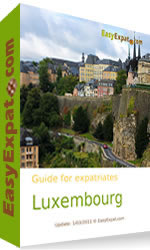Luxembourg guide for expats in French / Guide pour expatriés au Luxembourg en français
 We have now fully manually translated our original guide in English into French.
We have now fully manually translated our original guide in English into French.
Luxembourg is a mighty little country, although most Luxembourgers would resent the use of "little". It is the sixth-smallest country, yet holds the prestige of being the only Grand Duchy in the world. It is also one of the top three richest countries in the world with a matching high standard of living.
Many people have come to enjoy it's treasures; Luxembourg has the highest proportion of inhabitants with a foreign passport among the EU countries. Stunning natural beauty, a dynamic banking sector, and international flair are packed into this tiny powerhouse.
The city of Luxembourg is both the capital and largest city. It is the hub of the rest of the nation, although it lies in the Southern half. The city is sometimes referred to as Luxembourg-Ville, or Luxembourg City to distinguish it from the country name.
Luxembourg is known for it's finance sector (world's second largest investment fund center, after the United States), but it also has successful industries in steel, technology, chemicals, rubber, and other products. The economy is highly developed and Luxembourg has the world's highest GDP per capita. Luxembourg's economy is stable, with moderate growth, low inflation, and low unemployment.
The French community living in Luxembourg has risen sharply. At the end of 2010 26,136 nationals were registered with the French Consulate, but the total is estimated to be more than 34,000 (to compare with 853 in 1875 and 13,000 in 1991). It is now the second foreign communities living in the Grand Duchy (after the Portuguese).
With 68,000 living in Lorraine, on the French side of the border, and coming to work in the Grand Duchy, French are at the 1st place of the foreign communities during the day.
Geographically, the French live mainly in the south (Gutland), the capital and its surroundings. In the city of Luxembourg, which more than half the residents are foreigners, the French are 10% of the inhabitants.
 You will find the usual articles in our guide
to prepare your expatriation and manage your life once in there:
Overview, Job, Passport, Visa & Permits, International Removal
Companies, Finding Accommodation, Work, Benefits and Tax, Moving in,
Education, Health, Practical Life (banks, transport, shopping...),
Entertainment...
You will find the usual articles in our guide
to prepare your expatriation and manage your life once in there:
Overview, Job, Passport, Visa & Permits, International Removal
Companies, Finding Accommodation, Work, Benefits and Tax, Moving in,
Education, Health, Practical Life (banks, transport, shopping...),
Entertainment...
You can also discuss and share experience in Luxembourg in our forum.
Guide pour expatriés au Luxembourg en français
Le Luxembourg est un pays minuscule, même si l'emploi de ce qualificatif ne ravit en général pas les Luxembourgeois. Il s'agit en effet du 6ème plus petit pays au monde mais ne vous y trompez pas, c'est bien le seul qui puisse s'enorgueillir d'être un Grand-Duché et cela reste l'un des trois pays les plus riches du monde offrant de fait une excellent qualité de vie.
Le Luxembourg accueille par conséquence de nombreux étrangers venus profiter des trésors que renferme le pays. Proportionnellement, c'est même le pays dans lequel on trouve le plus de ressortissants étrangers au sein de l'UE. La beauté des paysages, le secteur bancaire, très dynamique, et le parfum très international que nous venons d'évoquer donnent à ce petit pays un attrait particulier.
La ville de Luxembourg, située dans la partie sud du Grand-Duché, est la capitale du pays et également la ville la plus importante de par sa taille et sa population. L'appellation Luxembourg-Ville permet de distinguer la ville du pays.
Le Luxembourg est particulièrement réputé pour son secteur bancaire (numéro 2 mondial en matière de fonds d'investissement, derrière les Etats-Unis) mais certaines industries comme la métallurgie, l'industrie pharmaceutique, les technologies de pointe, la transformation du caoutchouc jouent également un rôle important dans l'économie, très développée, du pays. Le Luxembourg détient en effet le plus haut PIB du monde et peut se targuer de jouir d'une économie stable, à croissance et inflation modérées, avec un taux de chômage très bas.
La communauté française résidente au Luxembourg a connu une forte augmentation. Au 31 décembre 2010, 26 136 Français étaient inscrits auprès du consulat de France, mais l'ensemble est estimé à plus de 34 000 (contre 853 personnes en 1875 et 13.000 en 1991). Elle occupe désormais la 2ème place (après les Portugais) des communautés étrangères vivant au Grand-Duché.
Avec les 68 000 frontaliers lorrains venant travailler au Grand-Duché, les Français prennent, durant la journée, le 1ère place des communautés étrangères.
Sur le plan géographique, les Français se répartissent pour l’essentiel dans le sud du pays (Gutland), la capitale et ses alentours. Dans la ville de Luxembourg, dont plus de la moitié des habitants sont des étrangers, les Français en représentent le dixième.
 Comme d'habitude, vous trouverez toutes les informations dans notre guide
pour préparer votre expatriation et de gérer votre vie une fois là-bas:
présentation générale, emploi, passeports, visas, déménagements
internationaux, trouver un logement, travail, avantages sociaux et
fiscaux, l'emménagement, l'éducation, la santé, le vie sur place
(banques, transports, commerces ...), divertissements ...
Comme d'habitude, vous trouverez toutes les informations dans notre guide
pour préparer votre expatriation et de gérer votre vie une fois là-bas:
présentation générale, emploi, passeports, visas, déménagements
internationaux, trouver un logement, travail, avantages sociaux et
fiscaux, l'emménagement, l'éducation, la santé, le vie sur place
(banques, transports, commerces ...), divertissements ...
Vous pouvez également discuter et partager vos expériences au Luxembourg dans notre forum.
[Sources: http://www.diplomatie.gouv.fr & http://www.mfe.org]
Editorial Team :)